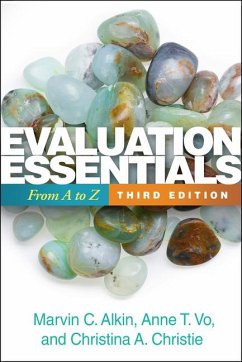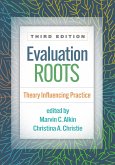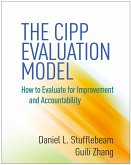- Gebundenes Buch
- Merkliste
- Auf die Merkliste
- Bewerten Bewerten
- Teilen
- Produkt teilen
- Produkterinnerung
- Produkterinnerung
Beloved for its conversational style and reliable advice, this text is now in a revised and updated third edition, reflecting key developments in evaluation. It includes expanded coverage of equity and social justice issues, values and cost analysis, visualizing qualitative data with software, and more.
Andere Kunden interessierten sich auch für
![Evaluation Essentials Evaluation Essentials]() Marvin C AlkinEvaluation Essentials81,99 €
Marvin C AlkinEvaluation Essentials81,99 €![Evaluation Roots Evaluation Roots]() Evaluation Roots94,99 €
Evaluation Roots94,99 €![Blue Marble Evaluation Blue Marble Evaluation]() Michael Quinn PattonBlue Marble Evaluation100,99 €
Michael Quinn PattonBlue Marble Evaluation100,99 €![Empowerment Evaluation and Social Justice Empowerment Evaluation and Social Justice]() David M FettermanEmpowerment Evaluation and Social Justice69,99 €
David M FettermanEmpowerment Evaluation and Social Justice69,99 €![Research Literacy Research Literacy]() Jeffrey S BeaudryResearch Literacy129,99 €
Jeffrey S BeaudryResearch Literacy129,99 €![The CIPP Evaluation Model The CIPP Evaluation Model]() Daniel L StufflebeamThe CIPP Evaluation Model112,99 €
Daniel L StufflebeamThe CIPP Evaluation Model112,99 €![Qualitative Inquiry and the Politics of Research Qualitative Inquiry and the Politics of Research]() Qualitative Inquiry and the Politics of Research206,99 €
Qualitative Inquiry and the Politics of Research206,99 €-
-
-
Beloved for its conversational style and reliable advice, this text is now in a revised and updated third edition, reflecting key developments in evaluation. It includes expanded coverage of equity and social justice issues, values and cost analysis, visualizing qualitative data with software, and more.
Hinweis: Dieser Artikel kann nur an eine deutsche Lieferadresse ausgeliefert werden.
Hinweis: Dieser Artikel kann nur an eine deutsche Lieferadresse ausgeliefert werden.
Produktdetails
- Produktdetails
- Verlag: Guilford Publications
- 3rd edition
- Seitenzahl: 344
- Erscheinungstermin: 19. November 2024
- Englisch
- Abmessung: 229mm x 152mm x 21mm
- Gewicht: 653g
- ISBN-13: 9781462555444
- ISBN-10: 1462555446
- Artikelnr.: 70553566
- Herstellerkennzeichnung
- Libri GmbH
- Europaallee 1
- 36244 Bad Hersfeld
- gpsr@libri.de
- Verlag: Guilford Publications
- 3rd edition
- Seitenzahl: 344
- Erscheinungstermin: 19. November 2024
- Englisch
- Abmessung: 229mm x 152mm x 21mm
- Gewicht: 653g
- ISBN-13: 9781462555444
- ISBN-10: 1462555446
- Artikelnr.: 70553566
- Herstellerkennzeichnung
- Libri GmbH
- Europaallee 1
- 36244 Bad Hersfeld
- gpsr@libri.de
Marvin C. Alkin, EdD, is Emeritus Professor in the Social Research Methods Division in the School of Education and Information Studies at the University of California, Los Angeles (UCLA). He has written extensively on evaluation practice, evaluation utilization, and comparative evaluation theory. Dr. Alkin is a founder and former Director of the UCLA Center for the Study of Evaluation. He has been a consultant to six national governments and has conducted more than 85 evaluations of a variety of educational, governmental, and foundation programs. He is a recipient of the Lazarsfeld Evaluation Theory Award and the Research on Evaluation Award from the American Evaluation Association. Anne T. Vo, PhD, is Associate Professor of Health Systems Science and Senior Director of Assessment and Evaluation at the Kaiser Permanente Bernard J. Tyson School of Medicine, where she leads the development and execution of the school's educational evaluation strategies and policies. As a research methodologist and systems scientist, Dr. Vo has provided consultation services and evaluation support to more than 35 social services programs and organizations, using community-driven and equity-oriented methods. She has an extensive record of publications in peer-reviewed journals and has held regional and national leadership roles with the American Evaluation Association, the American Educational Research Association, and the Southern California Evaluation Association. Christina A. Christie, PhD, is the Wasserman Dean and Professor of Education in the Division of Social Research Methodology in the School of Education and Information Studies at the University of California, Los Angeles. Her research is designed to strengthen understanding of evaluation as a method for facilitating social change and to advance frameworks for understanding evaluation models, with the goal of refining practice. Dr. Christie is a recipient of the Marcia Guttentag Early Career Award and the Research on Evaluation Award from the American Evaluation Association (AEA), as well as the Distinguished Scholar Award from the Research on Evaluation Special Interest Group of the American Educational Research Association. She has served on the board of AEA and as an associate editor and section editor of the American Journal of Evaluation.
Overview
Session A. What Is Evaluation?
Session B. Why Do Evaluations?
Session C. Who Does Evaluations?
Session D. Who Are the Users of an Evaluation?
Session E. How Do You Strengthen Relationships with Users?
Session F. How Do You Describe the Program?
Session G. How Do You "Understand" the Program?
Session H. What Are the Questions and Issues to Be Addressed?
Session I. What Are the Sociopolitical and Community Contexts of the
Program?
Session J. What Is the Organizational Context of the Program?
Session K. What Are Instruments for Collecting Quantitative Data?
Session L. What Are Instruments for Collecting Qualitative Data?
Session M. How Do Data Collection Issues Impact Potential Evaluability?
Session N. Are the Questions Evaluable?
Session O. How Do We Plan for Process-Focused Evaluation?
Session P. How Do We Plan for Outcome-Focused Evaluation?
Session Q. How Do We Manage the Evaluation?
Session R. How Are Quantitative Data Analyzed?
Session S. How Are Qualitative Data Analyzed?
Session T. How Are Analyzed Data Used to Answer Questions?
Session U. How Are Evaluation Results Reported?
Session V. What Is the Evaluator's Role in Evaluation Use?
Session W. What Are the Evaluation Standards and Codes of Behavior?
Session X. Contracting for Evaluations
Session Y. How Are Costs Analyzed?
Session Z. Context Sensitive Evaluation: Attaining Evaluation Use
Appendix A. Use Factors: Relationship to Research Compilations
Appendix B. How Can You Embark on a Program to Learn More about Evaluation?
Appendix C. An Evaluation Lesson, by "Unknown Student"
Index
About the Authors
Session A. What Is Evaluation?
Session B. Why Do Evaluations?
Session C. Who Does Evaluations?
Session D. Who Are the Users of an Evaluation?
Session E. How Do You Strengthen Relationships with Users?
Session F. How Do You Describe the Program?
Session G. How Do You "Understand" the Program?
Session H. What Are the Questions and Issues to Be Addressed?
Session I. What Are the Sociopolitical and Community Contexts of the
Program?
Session J. What Is the Organizational Context of the Program?
Session K. What Are Instruments for Collecting Quantitative Data?
Session L. What Are Instruments for Collecting Qualitative Data?
Session M. How Do Data Collection Issues Impact Potential Evaluability?
Session N. Are the Questions Evaluable?
Session O. How Do We Plan for Process-Focused Evaluation?
Session P. How Do We Plan for Outcome-Focused Evaluation?
Session Q. How Do We Manage the Evaluation?
Session R. How Are Quantitative Data Analyzed?
Session S. How Are Qualitative Data Analyzed?
Session T. How Are Analyzed Data Used to Answer Questions?
Session U. How Are Evaluation Results Reported?
Session V. What Is the Evaluator's Role in Evaluation Use?
Session W. What Are the Evaluation Standards and Codes of Behavior?
Session X. Contracting for Evaluations
Session Y. How Are Costs Analyzed?
Session Z. Context Sensitive Evaluation: Attaining Evaluation Use
Appendix A. Use Factors: Relationship to Research Compilations
Appendix B. How Can You Embark on a Program to Learn More about Evaluation?
Appendix C. An Evaluation Lesson, by "Unknown Student"
Index
About the Authors
Overview
Session A. What Is Evaluation?
Session B. Why Do Evaluations?
Session C. Who Does Evaluations?
Session D. Who Are the Users of an Evaluation?
Session E. How Do You Strengthen Relationships with Users?
Session F. How Do You Describe the Program?
Session G. How Do You "Understand" the Program?
Session H. What Are the Questions and Issues to Be Addressed?
Session I. What Are the Sociopolitical and Community Contexts of the
Program?
Session J. What Is the Organizational Context of the Program?
Session K. What Are Instruments for Collecting Quantitative Data?
Session L. What Are Instruments for Collecting Qualitative Data?
Session M. How Do Data Collection Issues Impact Potential Evaluability?
Session N. Are the Questions Evaluable?
Session O. How Do We Plan for Process-Focused Evaluation?
Session P. How Do We Plan for Outcome-Focused Evaluation?
Session Q. How Do We Manage the Evaluation?
Session R. How Are Quantitative Data Analyzed?
Session S. How Are Qualitative Data Analyzed?
Session T. How Are Analyzed Data Used to Answer Questions?
Session U. How Are Evaluation Results Reported?
Session V. What Is the Evaluator's Role in Evaluation Use?
Session W. What Are the Evaluation Standards and Codes of Behavior?
Session X. Contracting for Evaluations
Session Y. How Are Costs Analyzed?
Session Z. Context Sensitive Evaluation: Attaining Evaluation Use
Appendix A. Use Factors: Relationship to Research Compilations
Appendix B. How Can You Embark on a Program to Learn More about Evaluation?
Appendix C. An Evaluation Lesson, by "Unknown Student"
Index
About the Authors
Session A. What Is Evaluation?
Session B. Why Do Evaluations?
Session C. Who Does Evaluations?
Session D. Who Are the Users of an Evaluation?
Session E. How Do You Strengthen Relationships with Users?
Session F. How Do You Describe the Program?
Session G. How Do You "Understand" the Program?
Session H. What Are the Questions and Issues to Be Addressed?
Session I. What Are the Sociopolitical and Community Contexts of the
Program?
Session J. What Is the Organizational Context of the Program?
Session K. What Are Instruments for Collecting Quantitative Data?
Session L. What Are Instruments for Collecting Qualitative Data?
Session M. How Do Data Collection Issues Impact Potential Evaluability?
Session N. Are the Questions Evaluable?
Session O. How Do We Plan for Process-Focused Evaluation?
Session P. How Do We Plan for Outcome-Focused Evaluation?
Session Q. How Do We Manage the Evaluation?
Session R. How Are Quantitative Data Analyzed?
Session S. How Are Qualitative Data Analyzed?
Session T. How Are Analyzed Data Used to Answer Questions?
Session U. How Are Evaluation Results Reported?
Session V. What Is the Evaluator's Role in Evaluation Use?
Session W. What Are the Evaluation Standards and Codes of Behavior?
Session X. Contracting for Evaluations
Session Y. How Are Costs Analyzed?
Session Z. Context Sensitive Evaluation: Attaining Evaluation Use
Appendix A. Use Factors: Relationship to Research Compilations
Appendix B. How Can You Embark on a Program to Learn More about Evaluation?
Appendix C. An Evaluation Lesson, by "Unknown Student"
Index
About the Authors








